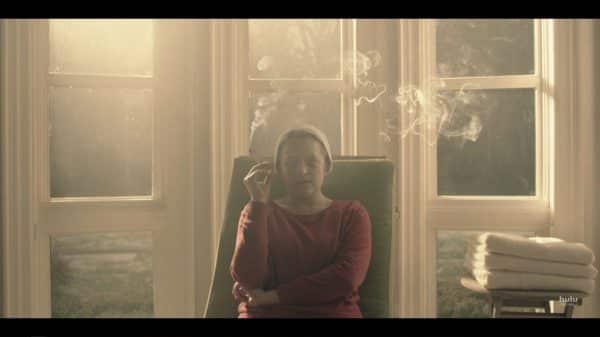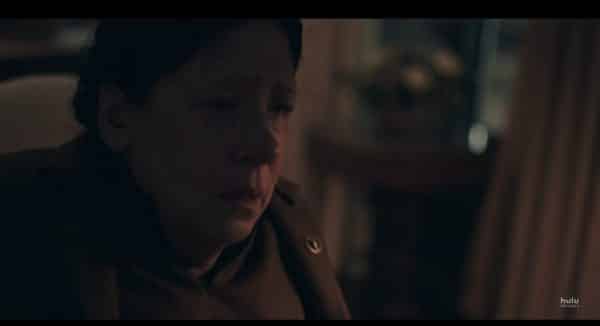The Handmaid’s Tale: Season 3, Episode 4 “God Bless The Child” – Recap, Review (with Spoilers)
June really tests the limits of her influence, but this time with the Waterfords and Aunt Lydia. Especially when Janine puts herself in a dangerous situation.

Spoiler Alert: This summary and review contains spoilers.
Additionally, some images and text may include affiliate links, meaning we may earn a commission or receive products if you make a purchase.
June really tests the limits of her influence, but this time with the Waterfords and Aunt Lydia. Especially when Janine puts herself in a dangerous situation.
| Network | ||
| Hulu | ||
| Director(s) | Amma Asante | |
| Writer(s) | Eric Tuchman | |
| Air Date | 6/12/2019 | |
| Introduced This Episode | ||
| Oliver | Charlie Zeltzer | |
| OfMatthew | Ashleigh LaThrop | |
Images and text in this post may contain affiliate links which, if a purchase is made, we’ll earn money or products from the company. Affiliate links and external links have an upward facing, superscript, arrow.
Planning For The Future: June, OfMatthew, Oliver, Sylvia, Emily
Thanks to a celebration to honor recent babies born, it seemed June was going to have herself a nice recruitment event. However, between her walking partner OfMatthew and the after ceremony gathering taking place in a Commander’s home, she drops that idea.
However, while June is planning her revolution, Sylvia and Emily are trying to see if their old routines still work. Which, in the case of their son Oliver, it seems despite the time which has gone by, he is ready for Emily to return back to his life. He even asks her to read him a bedtime story. Leading to many people in tears but Emily not ready, just yet, to rejoin Sylvia and fully pick up where they left off.
Orchestrating Peace: June, Serena, Fred, Naomi
While Serena is willing to be social, and even visits Naomi’s home after the celebration of the new children, she wants nothing to do with Fred. So, as if she was a marriage counselor, Fred approaches June, and she comes up with a solution. One in which Fred would empower Serena, give her some say behind the scenes, and recognize she isn’t really the domestic type. Capable of it, to a point, but that isn’t what she lives for.
As for Serena? Well, she agrees to this. Isn’t sure how it will be executed but recognizes between her mother’s advice and the system she set up, divorce isn’t really an option. Much less, there is only so much embarrassment Fred can endure before it would bite her in the behind as well.
Separate & Unequal: Aunt Lydia, Janine, Naomi, Serena, June
As June is working her magic, Janine is entranced by seeing her baby again, and with Janine being who she is, naturally, she crosses the line. This creates a problem for Aunt Lydia because she loves Janine, but the girl is too sensitive for the life of a Handmaid. Add in Aunt Lydia’s own frustrations with nearly being killed, and now feeling vulnerable, and it leads to her, when Janine makes Naomi and the Commander uncomfortable, beating her within an inch of her life. Leading to, strangely, June jumping on top of Janine to stop the assault. Thus leaving Aunt Lydia a bit embarrassed yet you realizing June may have allowed things to go this far for a point.
After all, the separation of each sect in the population isn’t just about control but to lessen sympathy. So to see Janine not only without an eye but longing for her child, and beaten like a slave, it puts things in perspective. Maybe not for the husbands, for this doesn’t effect their callous a**es, but the wives may feel differently.
Perhaps leading to why Serena gave June the information she needed to see Hannah. Maybe even take her from the school if she ever got plans to escape. For while Serena may mourn what could have been with Nichole, seeing Janine’s pain puts things in perspective.
Other Noteworthy Facts & Moments
- Nichole gets baptized thanks to Moira and Luke – also, Commander Waterford and Serena learn, thanks to an Eye, that Nichole is across the border. June, thanks to being nosey, learns this too.
Commentary
Janine’s Beating & Serena’s Comment
I firmly believe June allowed Janine to make a fool of herself and cause a scene. She was right there, could have grabbed Janine, make a real effort, but instead didn’t. What she wanted to do was one of two things: Help show how damaging the system is to women like Janine or expose those like Aunt Lydia who are more brutal than perhaps known. For while the Commanders may know what happens, and likely don’t care, as shown by Naomi’s kindness, the wives are different. They can still be reached, and so June wanted to tap into that sympathy.
After all, if she is going to manipulate Serena into a leader and push Fred to empower her, she needs that moment which helps rally the troops. For what was the driving force last time that got Serena a following? Education. Some minimal feminist idea. That doesn’t compare to seeing an act of violence. Nearly every revolution, or civil rights movement, required shaming those in power and gaining the pity, sympathy, and support of those who didn’t want to be on the wrong side of history.
Now, you could say many of the wives may have a “Better them than me” attitude. However, as Serena notes, the women are often separated or watched for a reason. Even forbidden from whispering or gathering in groups – the Handmaids and Marthas that is. So, who better than the wives, who can usually congregate without male attention, to become a revolutionary force. All they needed was a reason. One beyond forcing another woman to be raped so that they can steal their child. Since, apparently, that wasn’t violent enough.
What May Happen To Aunt Lydia
With Benjamin, who often provides context in the comment section, making it clear the books are so much more brutal than the series, it leads you to wonder if anything may or will happen to Aunt Lydia. All things considered, she broke a few social norms. The first being, she beat a fertile Handmaid by kicking her, and maybe bashing her with a weapon. Secondly, she did that in mixed company with those above her. Third, perhaps the worst part, she did that in front of the wives and a child.
So comes the question, can or will she be punished? We saw what could have been an embarrassment, but could it have actually been fear? Lest we forget, Aunt Lydia is getting older, now requires a cane and scooter to get around, and that outburst could be seen as a red flag. Leading me to wonder, if there are punishments for aunts, besides death, what can they be? Do they take their eyes, cut their hands, and the same atrocities the Handmaids suffer?
Highlights
Emily, Sylvia, and Oliver – Together Again
June’s consistent victories take away from moments like Emily finding normalcy. Yet, it remains a highlight for Emily truly suffered to get this bliss. She didn’t just get shocked a few times but was sent to the colonies, her genitals were disfigured, and she was forced to maim or kill. Much less, someone she loved got killed due to her interacting with them. So to read to Oliver, be back in arms length with Sylvia, it was one of the rare times on this show you can say, despite the likelihood of the situation happening, you could suspend disbelief and just enjoy the scene.
On The Fence
June
I promise not to note how unrealistic June’s life is every episode, but I do find it strange how June can tell an Eye that she knows Luke, it be seen Nichole is with him, and yet it seems nothing happens. Lest we forget, the Commanders and Eyes have files which details the lives of nearly every woman we’ve ever seen. So surely this should be a sign that June had a part in Nichole’s escape. Which, in my mind, considering how grace an offense taking a child out of Gilead is, and they can’t touch Emily, June should be made an example of.
Follow Wherever I Look on Twitter, Like us on Facebook and Subscribe to the YouTube Channel.
Check Out The TV Master List Page
TV Shows We’re Covering This Season
Images used for editorial and commentary purposes. All rights remain with their respective copyright holders.




